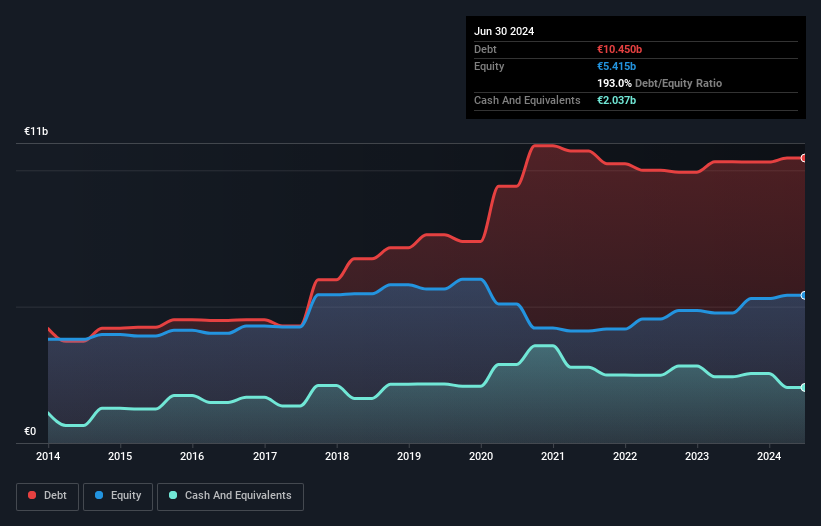
Some say volatility, rather than debt, is the best way to think about risk as an investor, but Warren Buffett famously said that 'Volatility is far from synonymous with risk.' When we think about how risky a company is, we always like to look at its use of debt, since debt overload can lead to ruin. As with many other companies Aeroports de Paris SA (EPA:ADP) makes use of debt. But should shareholders be worried about its use of debt?
What Risk Does Debt Bring?
Debt is a tool to help businesses grow, but if a business is incapable of paying off its lenders, then it exists at their mercy. In the worst case scenario, a company can go bankrupt if it cannot pay its creditors. While that is not too common, we often do see indebted companies permanently diluting shareholders because lenders force them to raise capital at a distressed price. Of course, debt can be an important tool in businesses, particularly capital heavy businesses. When we examine debt levels, we first consider both cash and debt levels, together.
View our latest analysis for Aeroports de Paris
How Much Debt Does Aeroports de Paris Carry?
The chart below, which you can click on for greater detail, shows that Aeroports de Paris had €10.5b in debt in June 2024; about the same as the year before. However, it does have €2.04b in cash offsetting this, leading to net debt of about €8.41b.

How Strong Is Aeroports de Paris' Balance Sheet?
Zooming in on the latest balance sheet data, we can see that Aeroports de Paris had liabilities of €4.00b due within 12 months and liabilities of €10.5b due beyond that. On the other hand, it had cash of €2.04b and €1.45b worth of receivables due within a year. So its liabilities outweigh the sum of its cash and (near-term) receivables by €11.0b.
When you consider that this deficiency exceeds the company's huge €10.9b market capitalization, you might well be inclined to review the balance sheet intently. In the scenario where the company had to clean up its balance sheet quickly, it seems likely shareholders would suffer extensive dilution.
We measure a company's debt load relative to its earnings power by looking at its net debt divided by its earnings before interest, tax, depreciation, and amortization (EBITDA) and by calculating how easily its earnings before interest and tax (EBIT) cover its interest expense (interest cover). Thus we consider debt relative to earnings both with and without depreciation and amortization expenses.
Aeroports de Paris has a debt to EBITDA ratio of 4.0 and its EBIT covered its interest expense 5.9 times. Taken together this implies that, while we wouldn't want to see debt levels rise, we think it can handle its current leverage. We note that Aeroports de Paris grew its EBIT by 29% in the last year, and that should make it easier to pay down debt, going forward. There's no doubt that we learn most about debt from the balance sheet. But it is future earnings, more than anything, that will determine Aeroports de Paris's ability to maintain a healthy balance sheet going forward. So if you want to see what the professionals think, you might find this free report on analyst profit forecasts to be interesting.
Finally, a company can only pay off debt with cold hard cash, not accounting profits. So the logical step is to look at the proportion of that EBIT that is matched by actual free cash flow. Over the most recent three years, Aeroports de Paris recorded free cash flow worth 52% of its EBIT, which is around normal, given free cash flow excludes interest and tax. This cold hard cash means it can reduce its debt when it wants to.
Our View
On our analysis Aeroports de Paris's EBIT growth rate should signal that it won't have too much trouble with its debt. But the other factors we noted above weren't so encouraging. For instance it seems like it has to struggle a bit to handle its total liabilities. We would also note that Infrastructure industry companies like Aeroports de Paris commonly do use debt without problems. Looking at all this data makes us feel a little cautious about Aeroports de Paris's debt levels. While debt does have its upside in higher potential returns, we think shareholders should definitely consider how debt levels might make the stock more risky. When analysing debt levels, the balance sheet is the obvious place to start. However, not all investment risk resides within the balance sheet - far from it. Be aware that Aeroports de Paris is showing 2 warning signs in our investment analysis , and 1 of those doesn't sit too well with us...
Of course, if you're the type of investor who prefers buying stocks without the burden of debt, then don't hesitate to discover our exclusive list of net cash growth stocks, today.
New: Manage All Your Stock Portfolios in One Place
We've created the ultimate portfolio companion for stock investors, and it's free.
• Connect an unlimited number of Portfolios and see your total in one currency
• Be alerted to new Warning Signs or Risks via email or mobile
• Track the Fair Value of your stocks
Have feedback on this article? Concerned about the content? Get in touch with us directly. Alternatively, email editorial-team (at) simplywallst.com.
This article by Simply Wall St is general in nature. We provide commentary based on historical data and analyst forecasts only using an unbiased methodology and our articles are not intended to be financial advice. It does not constitute a recommendation to buy or sell any stock, and does not take account of your objectives, or your financial situation. We aim to bring you long-term focused analysis driven by fundamental data. Note that our analysis may not factor in the latest price-sensitive company announcements or qualitative material. Simply Wall St has no position in any stocks mentioned.
About ENXTPA:ADP
Average dividend payer with moderate growth potential.
Similar Companies
Market Insights
Community Narratives


